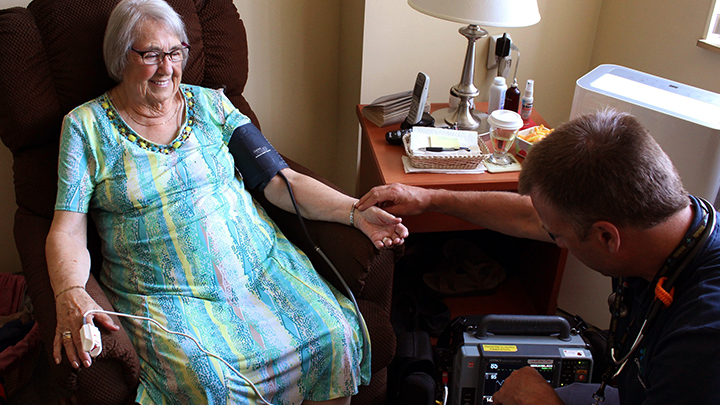
July 17, 2018

Community Paramedic Lou Labrash, right, stops by the home of Complex Care Hub patient Olive Willey to check her vital signs.
Story & photo by Blain Fairbairn
CALGARY — For 89 of her 90 years, Olive Willey never spent a night in hospital. Even after her visit to the emergency department at Rockyview General Hospital (RGH) last spring, she spent just one day in a hospital bed thanks to its new Complex Care Hub (CCH) program.
The innovative program serves as a bridge between acute care sites and the community, says Dr. Michelle Grinman, a General Internal Medicine specialist at RGH and originator of CCH in the Calgary Zone.
“It’s like a virtual inpatient unit that allows eligible patients to receive the same kind of care and treatment they would in hospital, but within the comfort of their own home,” she adds.
Under the CCH program, patients who come into RGH’s emergency department for non-urgent treatment are admitted and followed as they would be under a conventional hospital admission. But unlike traditional inpatients, CCH patients aren’t transferred to a unit in the hospital to recover — but instead sleep at home.
Patients who meet the program’s criteria are given a choice — participate in CCH or stay as an inpatient at the hospital. Those who choose CCH are sent home where they receive daily care and monitoring from a team that includes a community paramedic, a nurse navigator and an RGH general internist. Rigorous safety protocols ensure patients have a direct line to their care team should questions or concerns arise while they’re at home.
Tests and lab work can be ordered — just as if the patient were in the hospital — and complementary services such as home care, physiotherapy, occupational therapy and social work are available through the CCH team to ensure a continuum of care.
Dr. Grinman is also working to develop relationships with Calgary’s Primary Care Networks to transition patients safely to the community, and to connect them with services they need to succeed outside of the hospital. This comprehensive team approach not only benefits patients by allowing them to recover within the comfort of their home, it also improves the healthcare system through more efficient use of resources.
“We know that hospital-at-home services have been shown to reduce visits to emergency departments and provide flexibility during crises or surge situations,” says Dr. Grinman. “Older adults treated within this model are also less likely to have functional decline and need long-term care or assisted living one year later.
“For patients over 70, there is reduced mortality when hospital-level care is delivered at home,” she says, referencing the numerous studies done on similar initiatives around the world.
“When a senior comes to the hospital and receives meals in bed and isn’t walking around, they’re more likely to deteriorate quicker than patients being treated at home who remain active and independent.”
For Willey and her family, the CCH means quality of life isn’t sacrificed for quality of care.
“You’re in your own bed, you can go have coffee with friends — you’re not stuck in a hospital bed the whole time,” says Willey. “When the doctor gave me the option to stay in hospital or go home, it was an easy decision to make.”
Daughter Dianne Arnott says she felt confident about her mom’s choice:
“There were no concerns for mom’s care whatsoever. It was a logical choice, really. She wasn’t sick enough to stay in hospital, but she’s still getting the care she needs when she needs it, whether it’s from her community paramedic or the doctor at Rockyview. The attention has been very fast and thorough. We’re very impressed.”